An Orange Day Sermon to End Violence Against Women
The following sermon by Rev. Jeffrey Geary was originally preached at the White Plains Presbyterian Church on the Ninth Sunday after Pentecost, July 29, 2012, and is published here on October 25, 2012, this month’s Orange Day, when Unbound, in collaboration with the Presbyterian Ministry at the United Nations, lifts up voices that name and challenge violence against women and girls.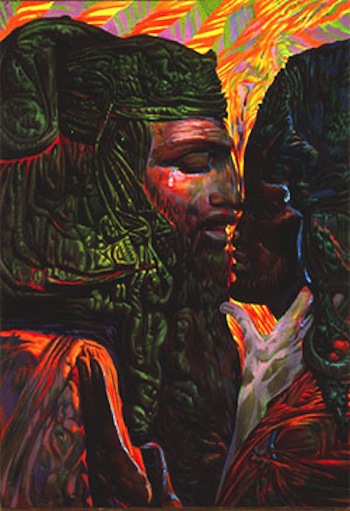 2 Samuel 11:1-15
2 Samuel 11:1-15
In the spring of the year, the time when kings go out to battle, David sent Joab with his officers and all Israel with him; they ravaged the Ammonites, and besieged Rabbah. But David remained at Jerusalem.
It happened, late one afternoon, when David rose from his couch and was walking about on the roof of the king’s house, that he saw from the roof a woman bathing; the woman was very beautiful. David sent someone to inquire about the woman. It was reported, ‘This is Bathsheba daughter of Eliam, the wife of Uriah the Hittite.’ So David sent messengers to fetch her, and she came to him, and he lay with her. (Now she was purifying herself after her period.) Then she returned to her house. The woman conceived; and she sent and told David, ‘I am pregnant.’
So David sent word to Joab, ‘Send me Uriah the Hittite.’ And Joab sent Uriah to David. When Uriah came to him, David asked how Joab and the people fared, and how the war was going. Then David said to Uriah, ‘Go down to your house, and wash your feet.’ Uriah went out of the king’s house, and there followed him a present from the king. But Uriah slept at the entrance of the king’s house with all the servants of his lord, and did not go down to his house. When they told David, ‘Uriah did not go down to his house’, David said to Uriah, ‘You have just come from a journey. Why did you not go down to your house?’ Uriah said to David, ‘The ark and Israel and Judah remain in booths; and my lord Joab and the servants of my lord are camping in the open field; shall I then go to my house, to eat and to drink, and to lie with my wife? As you live, and as your soul lives, I will not do such a thing.’ Then David said to Uriah, ‘Remain here today also, and tomorrow I will send you back.’ So Uriah remained in Jerusalem that day. On the next day, David invited him to eat and drink in his presence and made him drunk; and in the evening he went out to lie on his couch with the servants of his lord, but he did not go down to his house.
In the morning David wrote a letter to Joab, and sent it by the hand of Uriah. In the letter he wrote, ‘Set Uriah in the forefront of the hardest fighting, and then draw back from him, so that he may be struck down and die.’
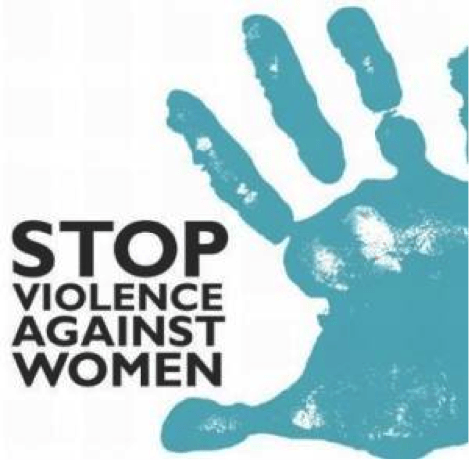 The David Story: A Royal Violation
The David Story: A Royal Violation
This is a difficult text. David has been the recipient of extraordinary divine favor. He has risen from shepherd boy to shepherd king, responsible for the care of all God’s people. He has been promised a lineage of favored sons which will eventually stretch all the way to Jesus.
And he raped a woman. Attempted to conceal her pregnancy. Betrayed, and murdered her husband.
This is not a sermon about how there is good in everyone, how we are all saint and sinner, mixed bags of good and bad, how even the worst of sinners can be redeemed. This is not a sermon about David. This is a sermon about how we respond to violence. And in particular, violence against women.
For a very long time the church has responded to the violence in this text by either justifying it, denying it, or minimizing it. It has been justified by reading Bathsheba as a wanton woman, intentionally displaying herself and her body before the virile king in an attempt to seduce him. It has been denied by claiming that what took place was not rape but an affair between two adults – Illicit, yes. Wrong, yes. To be condemned, yes. But rape, no. And it has been minimized by noting that David eventually marries Bathsheba and that they have a son together who becomes the next King of Israel. A happy ending. There is even a tale in the Talmud that reads this as a love story in which David finally finds the right woman, the woman God had intended all along to be his wife – the love of his life.
What all of these strategies do – in justifying, denying, and minimizing – is ignore the dynamics of power in this story: the power of a king over his people and the power of a man over a woman. And David’s rape of Bathsheba is about both. Rape is an act of power – not sex; it involves sex, but it is not about sex. The text does bristle with allusions to sex and sexuality. Bathsheba’s name means “fertile woman.” We are specifically told that her monthly period has ended. David’s attempt to cover up the resulting pregnancy is all about getting Uriah to sleep with his wife – that’s what “washing his feet” means. And Uriah, the Hittite foreigner, is portrayed as an even better Hebrew than his king because he will not sleep with his wife while Ark of God and the other soldiers are in the field of battle (an allusion to Deuteronomy 23:9-11). But to make the problem in this story one of sex or sexuality rather than abuse and power is to repeat the violence of David against Bathsheba, the kind of violence that is perpetrated against women all the time. And that we cannot do.
David raped Bathsheba.
Sexual violence affects every woman’s life. In the two minutes that have passed since this sermon began, eight women have been injured in their homes by their husbands or boyfriends.[1]
Women and children are considerably less safe in the home than anywhere else. Battering is the major cause of injury to adult women. Marital rape is the most common kind of assault there is. One in three American girls before eighteen years and one in seven boys are sexually abused. It is estimated that a woman is raped in the United States every two minutes. Battering is a major cause of homelessness for women and children. At least forty percent of homeless women are women who were abused by their partners, and left. They now face violence on the street rather than battering in their home.[2]
This is intolerable. But it is reality. Every day. One reason it persists is that we do not talk about it.
Today is this month’s Orange Day. Orange Day is part of United Nations Secretary-General Ban Ki-moon’s UNiTE to End Violence against Women campaign which aims to prevent and eliminate violence against women and girls in all parts of the world. The UNiTE campaign proclaims the 25th of every month as Orange Day, aiming to raise awareness about the issue of violence against women and girls, not only once a year on November 25th (the International Day to End Violence against Women), but every month! The intent is not just to wear something orange, but to do (or commit to doing) something concrete. My commitment was to begin this sermon.
Two years ago, the 219th General Assembly of the Presbyterian Church proclaimed that
In light of the many forms of violence perpetuated against women, [we condemn] violence against women in all forms and under all circumstances as violations of God’s will for women and men, whether that violence is perpetuated by a stranger or by an intimate partner, and [we commend and encourage] all persons who provide shelter, counseling, and other forms of assistance for women experiencing coercion and violence.
Of course sadly some of this counseling advocates that women return to abusive relationships. Even today, with increased awareness of violence against women, too many pastors of Christian churches encourage women to return to their abusers and “turn the other cheek.” I want to say clearly, that this is not the gospel. God does not intend for women or children or anyone who is vulnerable to be subjected to the violent power of another person. And if you are sitting here and have been raped or violated, I want to say to you “God loves you. Know that you were made in God’s image and that image has not been taken from you. Instead, let us keep in mind another saying of Jesus, ‘the truth shall set you free.’” I declare this church to be safe space for any woman who is abused.
Proclaiming this ‘good news’ is something every congregation can do. Many churches make the numbers of abuse and rape hotlines available on their bulletin boards (we do) and websites, and have referral information to experienced counselors. Others collect those little soaps, lotions and shampoos we all get at hotels and donate them to women’s shelters. As a result, members are reminded that violence against women is an ongoing problem each time they travel for business or pleasure. I know I pray about domestic violence every year on Super Bowl Sunday, which has the highest incidence of violence against women in the entire year. There are certainly other things we could do as a congregation, and I welcome your ideas.
But having said that the problem of violence against women, in this text and in our culture, is one of power, particularly male power, I do want to say that one reason we don’t talk about it is that we don’t talk about sex and sexuality. Oh, I know there is a lot of sex ‘out there’ in our culture, almost to the point where it seems we are surrounded by little else. But just because sex is used in advertising, appears in movies, is sung about in pop songs and saturates our language, does not mean that we are good at talking about what it means to be embodied creatures, to have bodies that feel pleasure and pain, which can be hurt and healed, can be both abused and excited. Motherhood, for example, is not just a feeling of love for a child but a physical experience (and sometimes ordeal). We don’t have enough liturgies and hymns that speak to this HUGE part of our lives, which means we lack language to talk about the physical experience of both sin and redemption.
There are many examples of this in our churches, including our own Presbyterian Church, but the one that comes to mind today is the story of Sister Margaret Farley. A couple of years ago Farley, published what, for my money, is one of the best textbooks available on the topic of Christian sexuality – or embodied life. It is called Just Love: A Framework for Christian Sexual Ethics. Professor Farley held the Gilbert Stark Chair in Christian Ethics at Yale University Divinity School for thirty years, where she began teaching in 1971, and is a past president of the Society of Christian Ethics and the Catholic Theological Society of America. She is also a Roman Catholic Sister. She has received numerous awards and recognition for her work in bioethics, for her work on health care and especially for her work on HIV in Africa. Nevertheless her book, written in 2006, became famous last year when the Vatican’s Congregation for the Doctrine of the Faith (CDF) judged it to cause “grave harm to the faithful.” As Mary Hunt has written, “War, poverty, ecocide, racism, colonialism, and sex and gender injustices of all sorts come to mind in the “grave harm” category.” But not a book on sexual ethics by a scholar of Farley’s caliber. In this single act of condemnation, the all male Roman Catholic Congregation for the Doctrine of the Faith (CDF) simultaneously showed its desire not to talk responsibly about sex and their desire to remove legitimacy from a woman within their power. Within 24 hours of the condemnation, literally overnight, Margaret’s book was propelled from an Amazon ranking of 143,000 (142,982) to 16.[3] It became a bestseller. That seems about right response.
There is no good news in our story today about the rape of Bathsheba. But it is immensely good that the story is told in our Bible, because most stories of rape and violence against women are not told; indeed some are never told. By exposing the abuse of power and sexual violence of David, Scripture makes it not only possible but imperative that we in the church talk about power and violence, particularly against women, today. And that we recognize that our bodies are a primary site for experiencing both sin and redemption. For in remembering the violence perpetrated upon women’s bodies, we are also called to ask, what would it mean instead to honor women’s bodies – not simply to NOT do violence, but to actually honor women’s bodies. And children’s bodies. And men’s bodies.
The practice of honoring the body is born of the confidence that our bodies are made in the image of God’s own goodness.
God created our bodies. God dwelled fully in a vulnerable human body. In death God gathers us up, body and all. Through our bodies we participate in God’s activity in the world.[4]
As the place where the divine presence dwells, our bodies are worthy of care and blessing and ought never to be degraded or exploited. In Honoring the Body: Meditations on a Christian Practice, Harvard Professor Stephanie Paulsell writes, “The practice of honoring the body challenges us to remember the sacredness of the body in every moment of our lives… In activities that punctuate our daily lives: bathing, clothing, eating, working, exercising, loving, suffering.”[5] It is through such daily bodily acts that we might learn to live more fully into the sacredness of our bodies and the bodies of others.
The sermon hymn “Sacred the Body” was sung this summer at the Churchwide Gathering of Presbyterian Women, meeting in Orlando. It was composed by Ruth Duck and speaks powerfully of the sacredness of human bodies, the tender care we each need and the protection we owe to one another. As we sing this song, let us reflect on how we individually and as a church can respond to violence against women and honor the image of God bestowed on every human being.
Take action for Orange Day
Notes
[1] Beth Basham and Sara Lisherness, eds. Strike Terror No More: The Church Responds to Domestic Violence. Bridge Resources, 1997.
[2] Carol Adams and Marie Fortune, eds., Violence against Women and Children: A Christian Theological Sourcebook. p.15.
[3] Mary Hunt, “Vatican Bungles Response to Sexual Ethics Book.” Religion Dispatches.
[4] Stephanie Paulsell, Honoring the Body: Meditations on a Christian Practice. The Practices of Faith Series. Jossey-Bass, 2002. p. 9.
[5] Stephanie Paulsell, Honoring the Body: Meditations on a Christian Practice. p. xiv.
The Rev. Jeffrey Geary is pastor of the White Plains Presbyterian Church, a vibrant, multicultural congregation in the heart of Westchester, NY. A graduate of Princeton Theological Seminary, he is also a medieval historian, a jam band enthusiast, and an avid rock climber. At the last meeting of the Hudson River Presbytery (Oct. 25), the entire delegation from his church wore Orange.

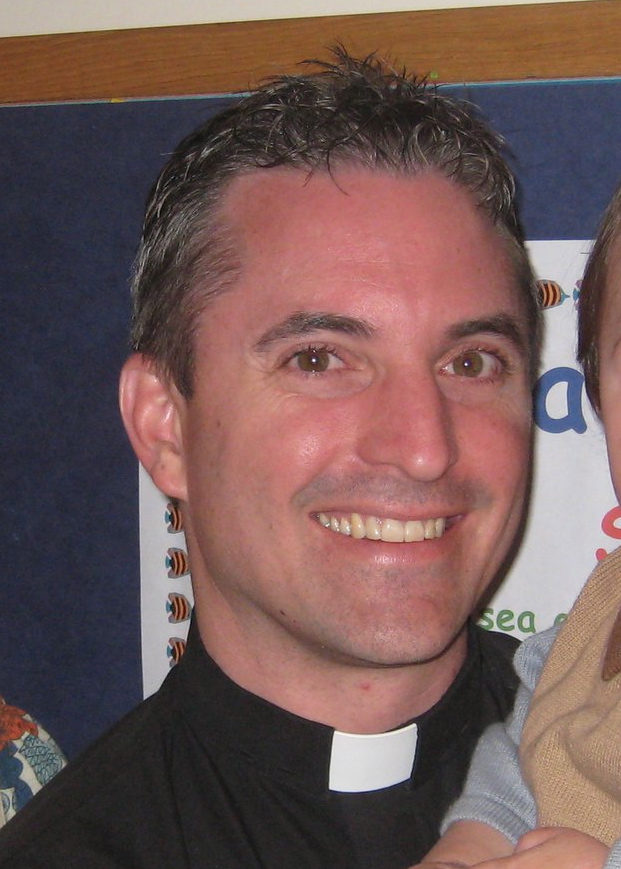

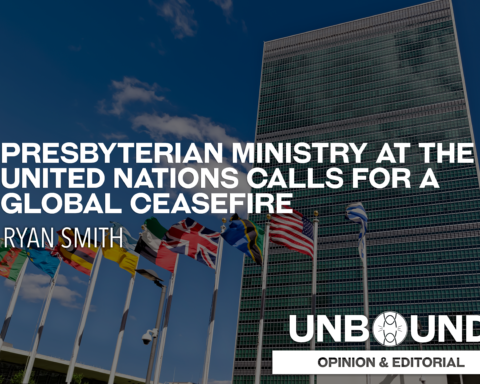

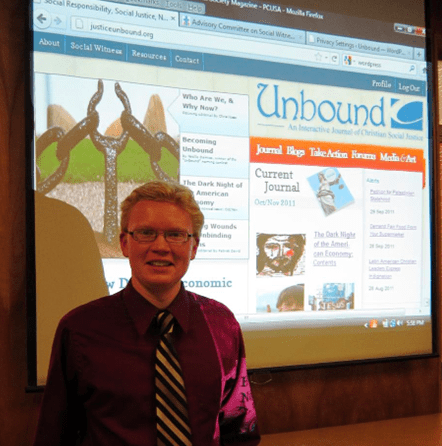

Unbound Social